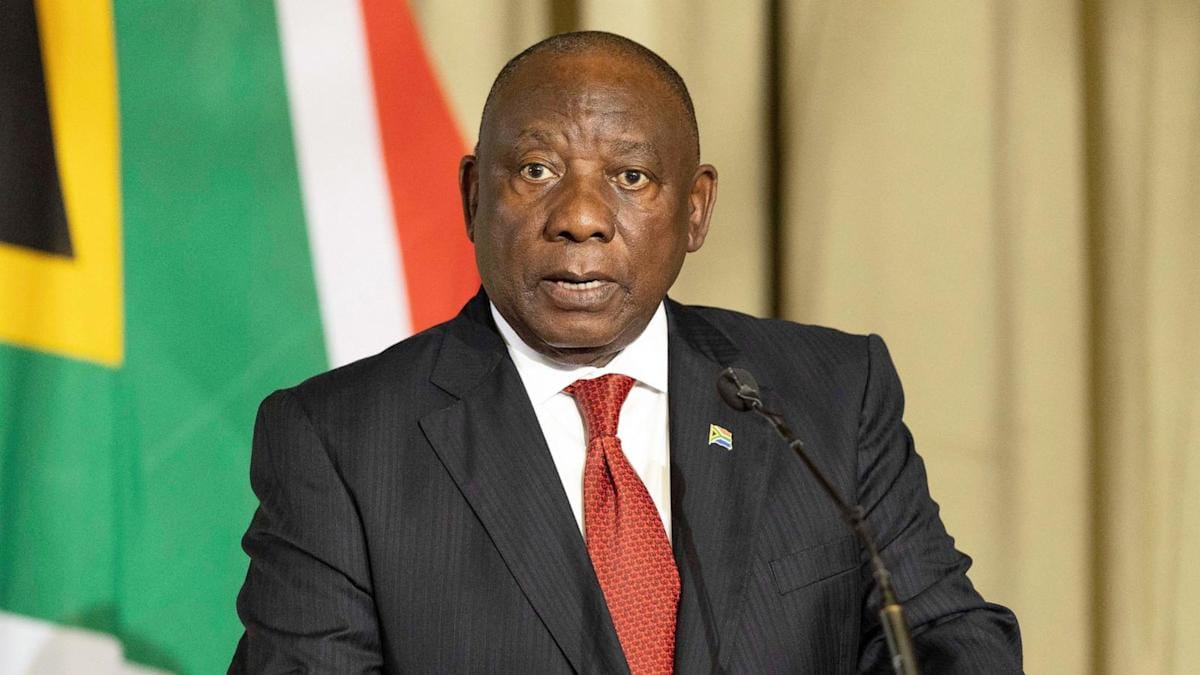South African President Ramaphosa Meets Trump to Reset Relations

Introduction
On May 21, 2025, South African President Cyril Ramaphosa met with U.S. President Donald Trump at the White House in a high-stakes diplomatic encounter aimed at resetting increasingly fractious relations between Africa’s most industrialized nation and the world’s largest economy. Against a backdrop of escalating rhetoric, U.S. aid cuts, and the controversial resettlement of white South Africans as refugees, Ramaphosa arrived in Washington with a dual mission: to robustly defend South Africa’s post-apartheid policies and to secure a path forward for economic and diplomatic cooperation. The meeting, marked by public confrontations over allegations of “white genocide” and land expropriation, also saw Ramaphosa pitch new trade and investment opportunities, highlighting the enduring importance of U.S.–South Africa ties in a shifting global landscape.
Diplomatic Context: A Relationship Under Strain
The Roots of Tension
The U.S.–South Africa relationship has been under acute strain since President Trump’s return to the White House in January 2025. The Trump administration has repeatedly accused Ramaphosa’s government of enacting “anti-white” policies, with Trump himself alleging a “genocide” against white farmers—a claim widely rejected by experts and the South African government. In February, Trump signed an executive order halting all foreign aid to South Africa, expelling its ambassador, and fast-tracking the resettlement of white Afrikaners as refugees in the United States[1][2][3][4]. The administration cited South Africa’s Expropriation Act, which allows land seizures without compensation in some cases, as evidence of ethnic targeting, despite the law’s stated aim of redressing apartheid-era injustices.
Economic Stakes
The United States is South Africa’s second-largest trading partner after China, and South Africa is a leading agricultural exporter under the African Growth and Opportunity Act (AGOA), which allows duty-free access to U.S. markets for eligible sub-Saharan African countries[5][6][2:1][7][3:1][8]. Trump’s aid cuts and threat to withdraw trade benefits have already led to a decline in critical services, including HIV testing, and cast a shadow over South Africa’s economic outlook. With AGOA set to expire in September and Congress unlikely to renew it, Ramaphosa faces mounting pressure to secure a new bilateral trade agreement and to restore investor confidence.
The White House Meeting: Confrontation and Diplomacy
A Charged Atmosphere
The Oval Office meeting was marked by a highly public confrontation. President Trump opened by reiterating claims of “white genocide,” showing Ramaphosa a video and a series of articles he said proved the persecution of white South Africans[9][10][11]. Trump insisted, “They eliminate the white farmers, and when they eliminate the white farmers, there are no consequences for them.” He highlighted the recent arrival of dozens of white Afrikaners in the United States as refugees, a move the South African government has denounced as based on a “completely false narrative”[1:1][11:1][3:2][12][4:1].
Ramaphosa firmly rejected the genocide allegations, stating, “South Africa operates as a multi-party democracy, which enables individuals to voice their opinions and political parties to follow diverse policies. In certain instances, these policies may not be in line with the government's stance.” He emphasized that the government’s policy is “entirely opposed” to the rhetoric of fringe groups and that crime in South Africa affects both white and Black citizens[9:1][13][10:1][4:2]. Ramaphosa also clarified that the Expropriation Act is intended to address historical land imbalances, not to target any ethnic group[2:2][4:3][14].
Strategic Delegation
Ramaphosa arrived with a carefully chosen delegation designed to appeal to Trump’s interests. South African golfing legends Ernie Els and Retief Goosen, as well as billionaire Johann Rupert, joined the president in Washington[5:1][6:1][54m]. The inclusion of these figures—famed for their business acumen and, in the case of Rupert, a personal fortune of $14 billion—was a calculated move to open doors for trade and investment discussions and to engage Trump on familiar terrain, both figuratively and literally[5:2][6:2][54m].
Elon Musk and the Business Angle
South African-born billionaire Elon Musk, a Trump ally and vocal critic of Ramaphosa’s policies, also attended the meeting[11:2][4:4]. Musk has previously accused the South African government of anti-white discrimination and has clashed with authorities over regulatory issues affecting his companies, Tesla and Starlink. Ramaphosa used the opportunity to propose new business opportunities for Musk’s ventures in South Africa and to mend strained personal relations[6:3][7:1][4:5].
Key Issues on the Table
Land Reform and the Expropriation Act
At the heart of the dispute is South Africa’s Expropriation Act, enacted in January 2025. The law permits the government to seize private land without compensation in certain cases, with the stated aim of redressing the legacy of apartheid, during which white South Africans—now about 8% of the population—came to own roughly three-quarters of private land[2:3][4:6][14:1]. Trump and his administration have characterized the law as targeted ethnic dispossession, while South African officials argue it is a necessary step to address historic injustice and create a more equitable society[2:4][4:7][14:2].
White Afrikaner Refugees
The Trump administration has granted expedited refugee status to white Afrikaners, citing claims of racial persecution[1:2][11:3][3:3][15][12:1][4:8]. This policy has been criticized as inconsistent, given Trump’s efforts to restrict immigration from other regions, and as based on unsubstantiated claims. South African police data show that farm murders affect both white and Black farmers, with no evidence of a systematic campaign against whites[4:9]. Ramaphosa denounced the resettlement as “ironic,” noting that Afrikaners remain among the most economically privileged groups in South Africa[4:10].
Trade and Economic Relations
Ramaphosa’s primary goal was to “recalibrate” ties with the U.S. and secure a new trade agreement to replace AGOA[5:3][6:4][2:5][7:2][3:4][8:1]. He highlighted the deep economic interdependence between the two countries, with nearly 600 U.S. firms investing in South Africa and 22 South African companies investing in the United States[9:2][5:4][6:5][7:3]. Ramaphosa also sought to address Trump’s “trade, not aid” approach by proposing expanded commercial partnerships, particularly in technology, energy, and infrastructure[5:5][6:6][7:4].
U.S. Demands and Sanctions
Trump’s administration has made clear that any future trade or investment deals must exempt U.S. companies from South Africa’s “racial requirements”—a reference to Black Economic Empowerment policies designed to promote economic inclusion for historically disadvantaged groups[7:5]. Trump has also linked aid and trade preferences to South Africa’s foreign policy, particularly its legal action against Israel at the International Court of Justice, and its alignment with Russia and China on global issues[2:6][3:5][8:2].
The Meeting’s Outcomes and Reactions
Public Confrontation, Private Diplomacy
The public portion of the meeting was dominated by Trump’s airing of grievances and Ramaphosa’s forceful rebuttal. Ramaphosa pushed back against the “white genocide” narrative, clarified the intent of land reform, and emphasized South Africa’s commitment to democracy and the rule of law[9:3][13:1][10:2][4:11]. Trump, for his part, described Ramaphosa as “a little controversial” but indicated a willingness to work together on “several developments occurring in South Africa and exploring ways we might assist”[9:4][39m].
Behind closed doors, the two leaders reportedly discussed a roadmap for restoring aid, expanding trade, and increasing U.S. investment, contingent on progress in areas of U.S. concern[5:6][6:7][7:6][3:6][14:3]. Ramaphosa offered proposals for a comprehensive trade agreement and new business opportunities for Tesla and Starlink, while Trump reiterated demands for policy changes and greater protections for U.S. businesses[5:7][6:8][7:7][3:7][8:3].
Domestic and International Reactions
The meeting drew intense scrutiny in both countries. In South Africa, Ramaphosa’s willingness to confront Trump was praised by some as a principled defense of national sovereignty, while others criticized him for risking economic ties in pursuit of political points at home[5:8][6:9][8:4]. In the U.S., Trump’s focus on white Afrikaner refugees and his confrontational style played well with segments of his political base but drew criticism from human rights groups and foreign policy experts who argued that the administration’s claims were unsupported by evidence[5:9][2:7][4:12][14:4].
Business leaders on both sides expressed cautious optimism that the meeting could pave the way for renewed commercial engagement, especially if a new trade deal can be reached before AGOA expires[5:10][6:10][7:8][3:8][8:5].
The Broader Implications
U.S.–South Africa Relations in a Changing World
The Ramaphosa–Trump meeting underscores the complexities of U.S.–Africa relations in an era of shifting global power. As the U.S. pivots toward transactional diplomacy and China deepens its economic footprint in Africa, South Africa finds itself navigating a more competitive and less predictable international environment[5:11][6:11][2:8][7:9][3:9][8:6]. The outcome of this meeting will shape the trajectory of U.S.–South Africa ties for years to come, with implications for trade, investment, and regional security.
The Future of Land Reform
South Africa’s land reform remains a flashpoint domestically and internationally. While the government insists it is a necessary corrective to apartheid-era dispossession, critics warn of potential economic disruption and political backlash. The international spotlight brought by Trump’s intervention has intensified debate, but the fundamental challenge of balancing justice, growth, and stability remains unresolved[2:9][4:13][14:5].
The Politics of Refuge and Race
The Trump administration’s decision to grant refugee status to white Afrikaners highlights the politicization of asylum policy and the enduring power of racial narratives in international relations[1:3][11:4][3:10][15:1][12:2][4:14]. For South Africa, it is a reminder of the country’s fraught history and the ongoing struggle to build an inclusive, equitable society.
Conclusion
President Cyril Ramaphosa’s visit to the White House was a defining moment in U.S.–South Africa relations. Confronted by President Trump over allegations of anti-white policies and land seizures, Ramaphosa defended his government’s record, challenged misinformation, and sought to redirect the relationship toward trade and investment. The meeting exposed deep divisions but also opened the door to renewed engagement, provided both sides can find common ground on the issues that matter most. As the global order continues to shift, the ability of leaders like Ramaphosa to navigate these challenges will be critical—not only for their own countries but for the future of international diplomacy.
https://abcnews.go.com/Politics/trump-host-south-africas-president-amid-tensions-us/story?id=122002870 ↩︎ ↩︎ ↩︎ ↩︎
https://time.com/7287435/united-states-south-africa-conflict-trump-ramaphosa-white-house-meeting/ ↩︎ ↩︎ ↩︎ ↩︎ ↩︎ ↩︎ ↩︎ ↩︎ ↩︎ ↩︎
https://www.wsj.com/world/africa/trump-south-africa-president-ramaphosa-visit-3fa67569 ↩︎ ↩︎ ↩︎ ↩︎ ↩︎ ↩︎ ↩︎ ↩︎ ↩︎ ↩︎ ↩︎
https://www.nytimes.com/2025/05/19/world/africa/south-africa-white-genocide-trump-ramaphosa.html ↩︎ ↩︎ ↩︎ ↩︎ ↩︎ ↩︎ ↩︎ ↩︎ ↩︎ ↩︎ ↩︎ ↩︎ ↩︎ ↩︎ ↩︎
https://www.cfr.org/blog/ramaphosa-white-house ↩︎ ↩︎ ↩︎ ↩︎ ↩︎ ↩︎ ↩︎ ↩︎ ↩︎ ↩︎ ↩︎ ↩︎
https://www.reuters.com/world/africa/under-attack-by-trump-south-africas-ramaphosa-responds-with-trade-deal-offer-2025-05-21/ ↩︎ ↩︎ ↩︎ ↩︎ ↩︎ ↩︎ ↩︎ ↩︎ ↩︎ ↩︎ ↩︎ ↩︎
https://www.reuters.com/world/ramaphosa-trump-meeting-live-musk-starlink-deal-afrikaner-refugees-focus-2025-05-21/ ↩︎ ↩︎ ↩︎ ↩︎ ↩︎ ↩︎ ↩︎ ↩︎ ↩︎ ↩︎
https://www.cnn.com/2025/05/21/africa/south-africas-ramaphosa-visits-trump-latam-intl ↩︎ ↩︎ ↩︎ ↩︎ ↩︎ ↩︎ ↩︎
https://www.aljazeera.com/news/liveblog/2025/5/21/ramaphosa-trump-meeting-live-sa-visit-amid-afrikaner-genocide-claims ↩︎ ↩︎ ↩︎ ↩︎ ↩︎
https://www.cbsnews.com/news/trump-musk-south-africa-president-meeting-tense-relations/ ↩︎ ↩︎ ↩︎ ↩︎ ↩︎
https://www.usatoday.com/story/news/politics/2025/05/21/trump-south-africa-cyril-ramaphosa-trade-refugees/83732875007/ ↩︎ ↩︎ ↩︎
https://www.pbs.org/newshour/world/watch-live-ramaphosa-visits-white-house-after-trump-criticizes-south-african-policies ↩︎ ↩︎
https://responsiblestatecraft.org/ramaphosa-trump/ ↩︎ ↩︎ ↩︎ ↩︎ ↩︎ ↩︎
https://apnews.com/article/south-africa-afrikaners-trump-refugees-ramaphosa-c87264523d555a64c0588d8734bba83a ↩︎ ↩︎




